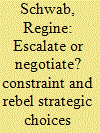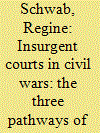|
|
|
Sort Order |
|
|
|
Items / Page
|
|
|
|
|
|
|
| Srl | Item |
| 1 |
ID:
191058


|
|
|
|
|
| Summary/Abstract |
Theories of interaction among rebel groups in civil wars, like other works in the armed conflict literature, continue to see force as foundational to the trajectory and outcome of conflict. But evidence from inter-rebel conflicts in the Syrian war, which has been one of the major civil wars of our times, shows that military force is not always the preferred tool even in situations where violence is presumably cheap: in conflicts between dominant rebel groups and weaker rivals. Rather than using force, Jabhat al-Nusra, one of the strongest groups in the Syrian conflict, frequently chose to negotiate with rivals. Existing theories of inter-rebel conflict fail to explain such variation in responses. As an explanation of this puzzle of non-force, I argue that the constraint emanating from the conflict with the main enemy determines rebels’ strategies towards rivals. To investigate this argument, the paper draws on the triangulation of original data on inter-rebel conflicts in Syria, encompassing written agreements between Jabhat al-Nusra and other rebel groups, a database of important military operations in the Syrian civil war since 2011, and interviews with civil and military participants in the insurgency. The findings have important implications not only for our understanding of inter-rebel dynamics in the Syrian conflict but also for other complex civil wars concerning the relationship between inter-rebel negotiation, cooperation, success, and war duration.
|
|
|
|
|
|
|
|
|
|
|
|
|
|
|
|
| 2 |
ID:
160879


|
|
|
|
|
| Summary/Abstract |
As part of research on the meso-foundations of conflict, the field of ‘rebel governance’ examines political institutions that regulate the affairs of civilians in wartime as well as their relations with armed actors. Judicial institutions play an important role in this and research has shown that they are widespread among both historical and current insurgencies. However, usually these bodies have been analysed in the context of one hegemonic faction like the Tamil Tigers in Sri Lanka and the Afghan Taliban. What is missing so far is an analysis of different pathways of (trans)formation of rebel courts. As exemplified by the three case studies of judicial institutions in Eastern Ghouta, Idlib and Aleppo, these are shaped by the distribution of power between ‘same-side’ groups, yielding unipolar, bipolar, or multipolar constellations. The analysis is located on the meso or movement level of insurgent social structures, complementing research on the micro and macro levels.
|
|
|
|
|
|
|
|
|
|
|
|
|
|
|
|
| 3 |
ID:
189348


|
|
|
|
|
| Summary/Abstract |
The introduction to the special issue starts from the observation that the political nature of rebel governance is so far understudied. Moving beyond the functionalism and instrumentalism inherent in parts of the literature, we propose a politicisation of the rebel governance paradigm through a spatial and temporal widening of analytical approaches. To address the methodological localism of existing research, rebel governance should be studied across actors and scales, as well as through their interlinkages. Taking time seriously, it also has to be investigated as a sequential phenomenon, at different conflict stages and with regard to its legacies in post-conflict settings.
|
|
|
|
|
|
|
|
|
|
|
|
|
|
|
|
|
|
|
|
|